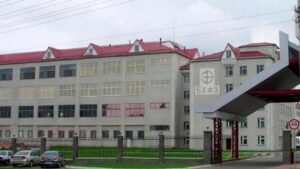
PJSC SIC Borshchahivskiy Chemical Pharmaceutical Plant (BCPP, Kyiv) increased production by 17.6% in 2023 compared to 2022, to almost UAH 1.866 billion, but reduced it by 3.3% in physical terms, to 34.8 million packs.
According to the plant’s information disclosure system, the company sold 40.3 million packs last year, which is 7.8% less than a year earlier, while total sales increased by 16.5% to UAH 1.806 billion.
At the same time, 29.4 million packs were sold in the domestic market (9.9% less than a year earlier) for UAH 1.537 billion (an increase of 16.2%).
At the same time, exports of products in 2023 increased by 18.5% in monetary terms to UAH 269 million, while decreasing by 1.7% in physical terms to 10.9 million packs.
BCPP notes that about 52% of the total product range last year was sold outside the country. In particular, 52% of export deliveries were made to neighboring countries, 48% – to Australia, the Middle East, Asia, Europe, North America and the Caribbean.
In 2023, the production nomenclature amounted to about 130 items of medicinal products in nine therapeutic areas, veterinary products, dietary supplements and extracts. In particular, the Company launched seven new products, including respiratory, digestive and metabolic, nervous system, musculoskeletal, antibiotic and dietary supplements.
Capital investments in the company’s own development in 2023 amounted to UAH 64.9 million.
In 2022, BCPP reduced its net profit by 24.8% to UAH 254.275 million. Net profit for 2020 increased by 1.7 times compared to 2019 to UAH 332.847 million.
As of the first quarter of 2023, 31.8% of BCPP shares were owned by the pharmaceutical company PrJSC “Pharmaceutical Firm “Darnitsa” (Kyiv).
According to the Opendatabot system, the ultimate beneficiaries of BCPP are also the beneficiary of the pharmaceutical company “Darnitsa” Hlib Zagoriy, Yevhen Sova and Tetiana Artemenko.
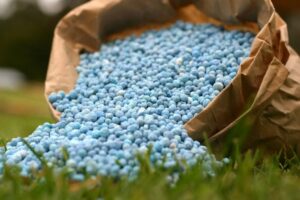
In 2023, the plants of Ostchem, a nitrogen holding company that unites Group DF’s nitrogen business, produced 2.1 million tons of mineral fertilizers, up 19.51% year-on-year.
According to a Group DF press release, Azot, the group’s Cherkasy-based plant, produced 1.56 million tons of mineral fertilizers in 2023, up 39.63% year-on-year, while Rivne Azot produced 528 thousand tons (-10.81%).
Urea, UAN and ammonium nitrate were the key fertilizers produced by Ostchem’s businesses, Group DF said.
According to the group, in 2023, it produced 835.9 thousand tons of ammonium nitrate, up 60.47% year-on-year, UAN – 572.7 thousand tons (+130%), and urea – 447.1 thousand tons (+145%). Production of UAN, a traditionally exported fertilizer produced by Rivne Azot, halved to 102 thousand tons.
“The fertilizer market is recovering, but imports of nitrogen fertilizers, which have increased significantly, do not allow us to fully utilize our plants. Despite the difficult situation in the agricultural sector, forced shutdowns of plants due to the hostilities, still high gas prices and abnormally high volumes of imports to Ukraine at dumping prices, Ostchem started to restore production in 2023. We fully met the demand from farmers even during peak periods,” said Sergiy Pavliuchuk, Production Director of Ostchem’s nitrogen business.
In 2023, Ostchem Holding doubled its production of UAN, the most promising fertilizer in Ukraine, to meet the demand. UAN was ranked second in terms of production, and its share in Ostchem’s product portfolio amounted to 27.3%, according to Group DF.
“It is no secret that we are negotiating with global players to develop several industrial sites. Our strategic plans include the construction of new workshops and enterprises. We are talking about investing in new, energy-efficient fertilizer production facilities and launching new products such as AdBlue, industrial gases, and petrochemicals,” added Pavliuchuk.
Commenting on the state of the domestic fertilizer market in Ukraine, Group DF said that the main feature of 2023 was the critical growth in imports imported at dumping prices. Compared to 2022, imports of mineral fertilizers to Ukraine increased 1.9 times, reaching 1.99 million tons. For example, urea imports increased 3.7 times over the year, reaching 501 thousand tons.
“A huge flow of cheap Belarusian and Russian fertilizers enters Ukraine through two channels: the first is from the former Soviet Union countries friendly to the aggressor. The second new channel is the re-export of Belarusian and Russian fertilizers from the EU. According to Eurostat, the total volume of nitrogen fertilizer imports to the EU increased by 34% in 2022-2023, while Russia accounted for about a third of these imports. Despite the sanctions and the existing embargo, a significant portion of these fertilizers is also entering Ukraine, slowly “killing” the Ukrainian producer and Ukrainian jobs,” emphasized Oleg Arestarkhov, Group DF’s Head of Corporate Communications.
In his opinion, the new trend is driven not only by Russia’s desire to expand its sales markets, but also by its strategic plan to make the EU and Ukraine dependent on its fertilizers.
Unable to compete with cheap imports, many EU companies are shutting down, and Ukrainian chemical companies such as Odesa Port and Sumykhimprom are also idle.
“The US and EU countries have already developed measures to ‘reduce dependence’ on fertilizers, grain and other food products from Russia. Formally, Ukraine has an embargo on imports of Russian and Belarusian fertilizers. However, fertilizers from these countries, as well as countries that buy cheap gas from Russia, continue to be supplied. As a result, our market is flooded with cheap imports, and Ukraine is facing critical dumping. Unfortunately, in 2023, we did not see any clear, tough economic actions by the authorities to protect the Ukrainian market and national producers. Fertilizer imports to the country are growing much faster than domestic production. Domestic production grew by about 20%, while imports grew by almost 100%,” stated Arestarkhov, adding that Ukraine needs to learn to better protect its interests.
Group DF consolidates Dmitry Firtash’s assets in the gas distribution, chemical, titanium and port industries, as well as in agriculture and media.
Ostchem is Group DF’s nitrogen holding company that unites the largest mineral fertilizer producers in Ukraine. It includes Rivne Azot, Cherkasy Azot, as well as Sievierodonetsk Azot and Stirol, which are not operating and are located in the occupied territories.
Cherkasy Azot PrJSC (Cherkasy, Ukraine) is one of the largest Ukrainian chemical companies and has been part of Group DF’s nitrogen business since 2011. The design production capacity of Cherkassy Azot is 962.7 thousand tons of ammonia, 970 thousand tons of ammonium nitrate, 891.6 thousand tons of urea, and 1 million tons of UAN per year.
Rivne Azot is one of the largest Ukrainian chemical companies in Western Ukraine and has been a part of Group DF’s Ostchem nitrogen holding since 2011. Since its acquisition, Firtash has invested over UAH 1.3 billion in Rivne Azot.
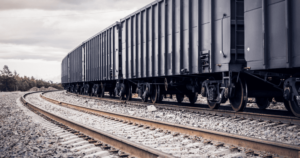
In 2023, Ukrzaliznytsia JSC (UZ) built 528 freight cars at its own facilities, which was a record figure for the last five years, the company’s press service said on Thursday.
It is noted that, in particular, 427 fitting platforms were manufactured. The company also started mass production of 50 dump cars and 50 hopper dispensers.
In addition, in 2023, at its own facilities, UZ built a grain carrier adapted for transportation on a 1520 mm gauge with a 1435 mm European gauge conversion. Most of the components and materials used for its construction were produced in Ukraine, the report says.
In 2023, UZ enterprises also increased the production of crushed stone by 33% (to 2.7 million tons) and sleepers by 6% (to 867 thousand units).
The production of reinforced concrete structures increased by 10.5% compared to 2022, to 6,937 thousand cubic meters, which was also a record for the last five years.
Among other things, last year UZ launched 47 new product lines. The company manufactured 37 thousand units of various products: girders and side girders, container stops, brake shoes, shock absorbers for the absorber, aluminum door frames, compressors, and generators for passenger cars. This allowed the company to save about UAH 120 million on external procurement, the company says.
“Plans for 2024 include a 15% increase in the volume of overhauls of locomotives at UZ plants and 8% increase in the volume of electric trains, an increase in crushed stone production through orders from third-party customers, and the development of new products and technologies,” Ukrzaliznytsia said in a statement.
Earlier, UZ announced the launch of a freight car fleet renewal program. The company planned to build 1,496 thousand freight cars in 2022 at its own car repair plants – Panyutyn, Darnytsia and Stryi: 1,446 thousand gondola cars and 50 grain carriers.
It was also reported that on December 28, 2021, the Ministry of Justice registered the order of the Ministry of Infrastructure No. 647, which launched a large-scale program to renew the freight car fleet of Ukraine in the period 2022-2031, introducing a phased limitation of their service life in a loaded state for as long as 10 years and bringing this period to the standard. The service life of gondola cars is reduced from 44 years to 22 years, and that of grain carriers from 45 years to 30 years.
In addition, this initiative envisaged the launch of a railcar construction program at Ukrainian railcar manufacturers. The volume of investments in the railcar industry was estimated at over UAH 120 billion.

Dnipro Metallurgical Plant (DMZ, formerly Dniprokoks), a part of DCH Steel of businessman Aleksandr Yaroslavsky’s DCH group, increased rolled metal output by 86.2% in 2023 compared to 2022, to 105.6 thousand tons, and coke output by 38.5%, to 292.7 thousand tons.
According to information in the corporate newspaper DCH Steel on Thursday, in December last year, the plant produced 5.2 thousand tons of rolled steel, reducing production by 35% compared to the previous month. Coke production decreased by 6% to 23.9 thousand tons in November 2023.
In 2022, the plant reduced rolled steel production by 74.2% compared to 2021, to 58.4 thousand tons, and coke production by 56.3%, to 211.3 thousand tons.
DMZ specializes in the production of steel, pig iron, rolled products and products made from them. On March 1, 2018, DCH Group signed an agreement to buy Dnipro Metallurgical Plant from Evraz.
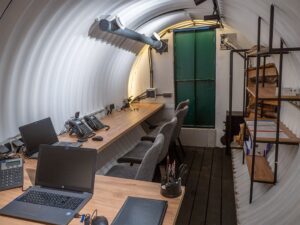
Metinvest Mining and Metallurgical Group has started manufacturing and supplying steel bunker headquarters to the Ukrainian Armed Forces to protect them from enemy shelling as part of Rinat Akhmetov’s Steel Front initiative.
According to the company’s press release on Friday, Metinvest has launched the production of steel underground command posts that protect personnel from the effects of shelling and enable the Ukrainian Armed Forces to operate in safe and comfortable conditions on the front line. The first steel headquarters, designed for 30 soldiers, has already been delivered to the Ukrainian Army free of charge and installed in one of the hottest areas of the frontline.
It is explained that the command post helps to save lives of the military, as it can be deployed and retracted on the front line in a short time and, if properly installed, provides protection against artillery fire of any caliber. The steel headquarters consists of five or six (depending on the configuration) separate mobile bunkers, the production of which Metinvest mastered in October 2022. These are interconnected underground shelters that perform various functions, from living quarters and a sanitary area to the command’s working headquarters. This creates a whole underground complex of buildings.
The bunkers, made of corrugated steel, are equipped with all the necessary equipment for a good hotel: sleeping and working areas, showers and boilers, heating, lighting and communication systems, storage for weapons and personal belongings, and electronic equipment. This makes it possible to use the underground headquarters not only as a shelter and a place of rest, but also as a work area that ensures the quality of the command’s work on the front line.
Metinvest’s Chief Operating Officer Alexander Mironenko noted that the war is long and combat operations have become a constant companion of every Ukrainian, especially those who defend the country in the ranks of the Armed Forces. Therefore, the development of improved bunkers and entire underground complexes is a contribution of Metinvest and Rinat Akhmetov’s Steel Front to improving the lives of soldiers on the front line.
“People are the most important thing. And if we can not only create a safe space from shelling but also make it as comfortable as possible, we do it. I hope that there will be more and more such control points on the front line, and these “underground towns” will become a reliable support for the command of military units. Metinvest is also planning to develop new configurations of underground steel complexes for other needs of the Armed Forces. That is why we will not stop until Ukraine wins,” commented Mr. Mironenko on the handover of the first command post to the Armed Forces.
The new command posts are based on a traditional bunker model – a “kryivka” – which Metinvest has already delivered to various brigades of the Armed Forces since 2022. The design of the standard steel bunker was modified for use as part of a permanent headquarters, with dimensions increased to 6 meters long and 2.3 meters high. Each “hideout” is designed for six people and is equipped with places for rest, storage of personal belongings and an integrated heating system. It takes about 400 hours for Metinvest’s specialists to make one such structure.
“The advantage of our army over the enemy is that we fight with quality and brains. And at the same time, we are able to make informed decisions quickly, because the lives of our soldiers and the success of combat operations are at stake. That’s why we strive to ensure the safety and create comfortable conditions for the military’s work and rest even at ground zero, in the heat of war. Command posts based on modular shelters meet the army’s request and allow us to set up fortified headquarters on the front line, which will fulfill their main task – to control the battle and inflict a crushing defeat on the enemy in any situation,” said Brigadier General Volodymyr Horbatiuk.
In total, since the beginning of the full-scale war, Metinvest has allocated UAH 4.8 billion to support Ukraine and Ukrainians. Of this amount, over UAH 2.5 billion was provided to the soldiers as part of Rinat Akhmetov’s Steel Front military initiative. The company has donated 150,000 bulletproof vests, 25,000 helmets and helmets, 80,000 anti-tank hedgehogs, 31,500 turnstiles, 1,500 drones, 2,000 thermal imagers, 500 vehicles, dozens of mine trawlers for tanks, patrol boats and lance catchers.
“Metinvest is a vertically integrated group of steel and mining companies. The Group’s enterprises are located mainly in Donetsk, Luhansk, Zaporizhzhia and Dnipropetrovs’k regions. The main shareholders of the holding are SCM Group (71.24%) and Smart Holding (23.76%), which jointly manage it. Metinvest Holding LLC is the management company of Metinvest Group.
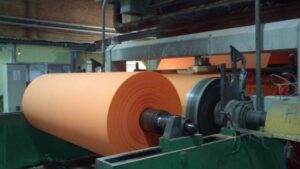
Cardboard and Paper Company LLC (Lviv), a major Ukrainian manufacturer of cardboard tubes and sanitary products, increased its production by 7% in 2023 to UAH 1 billion 268.5 million compared to 2022.
According to UkrPapir Association statistics provided to Interfax-Ukraine, the company slightly reduced its output of cardboard products in physical terms to 26.4 thousand tons, while increasing its production of paper base for sanitary products by 12.6% to almost 8 thousand tons. Production of toilet paper in rolls increased by 49% to 6.1 million units.
At the same time, in December, the company reduced its paper and cardboard production by 35.5% compared to the same month in 2022, to 2 thousand tons, which is also almost 35% less than in November last year.
LLC “Cardboard and Paper Company” produces products and semi-finished products from waste cardboard (cardboard sheets, corners, sleeves), cellulose and recycled waste paper (toilet paper, towels, napkins TM Papero). The company supplies its products, in particular, to the EU countries.
Among its customers are Biosphere and Arterium corporations, Nestle, Khlibprom, and Yarych confectionery.
As reported, in 2022, the factory increased its commercial output by 51.5% compared to 2021, up to UAH 1 billion 186 million, without stopping work during the year. Net profit tripled to UAH 263.7 million.